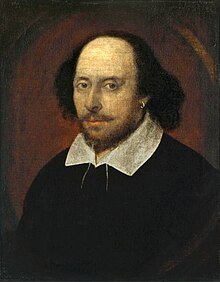
Back Шекспир, Уильиам Abkhazian William Shakespeare Afrikaans William Shakespeare ALS Шекспир, Уильям ALT ሼክስፒር Amharic William Shakespeare AN Willelm Sċacaspere ANG विलियम शेक्सपीयर ANP وليم شكسبير Arabic ويليام شيكسپير ARY
William Shakespeare | |
|---|---|
 The Chandos portrait (held by the National Portrait Gallery, London) | |
| Born | between 24 April 1563 and 23 April 1564 |
| Died | 23 April 1616 (aged 52) Stratford-upon-Avon, England |
| Resting place | Church of the Holy Trinity, Stratford-upon-Avon |
| Occupations |
|
| Years active | c. 1592 – 1613 |
| Era | |
| Known for | A dramatist who wrote 38 known dramas |
| Movement | English Renaissance |
| Spouse | Anne Hathaway (m. 1582) |
| Children | |
| Parents |
|
| Signature | |

William Shakespeare (between 26 April 1564 and 23 April 1564 – 23 April 1616) was an English dramatist, poet, and theatre actor. He wrote 40 known plays (with about half of them considered comedies) and two long poems in his lifetime. He lived in Stratford-upon-Avon, in Warwickshire, England. His plays are still performed today. He is often quoted in modern writing.
Shakespeare wrote his works between approximately 1592 and 1613. His plays are among the best known in English literature and are studied in schools around the world. Along with writing, Shakespeare also acted in The Chamberlain's Men acting company, starting in 1594.
Shakespeare wrote plays of different kinds, or genres. There are histories, tragedies and comedies. There is a popular myth that Shakespeare was the first person to write a tragicomedy. Tragicomedies were being written well before Shakespeare's birth and baptism.
Shakespeare's plays are written in poetic language. Many of the plays are set in strange, distant places and times. The stories are often exciting, romantic and happy (in the comedies), or very sad (in the tragedies). These stories make people want to know what will happen to the characters. The plays talk about things that are still important today, like love, sadness, hope, pride, hatred, jealousy, and foolishness.
Shakespeare added new words and phrases to the English language. He created over 1,700 English words.[1] He also made some words more popular.[2]
- ↑ "Words Shakespeare Invented".
- ↑ Vernon, Jennifer (22 April 2004). "Shakespeare's Coined Words Now Common Currency". news.nationalgeographic.com. Retrieved 27 March 2011.